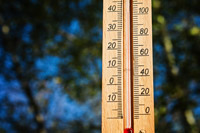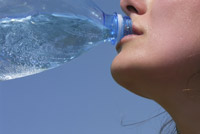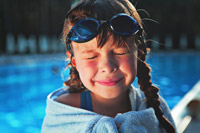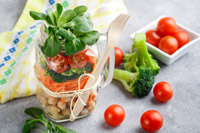Common Summer Illnesses That You Should Watch Out For

Since Japan's summer is hot and extremely humid, it is easy to get various diseases from loss of appetite, lifestyle problems, heatstroke, infections etc.
Heatstroke and Level of Symptoms

Level 1:Dehydration
It happens when the body's moisture is lost through sweating and it cannot be replenished. It can also cause loss of appetite. In addition, loss of electrolytes from bones and muscles can also result in leg tightness and numbness.
Level 2:Heat exhaustion
As a result of the balance of water and salt in the body is broken and the body temperature regulation function doesn’t work, symptoms such as headache, nausea, dizziness, malaise, severe cramps and unconsciousness can occur.
Level 3:Heatstroke
Since ability to regulate body temperature cannot keep up, it results in hyperthermia above 40℃, causing paralysis of the central thermoregulatory functions of the brain and heatstroke to occur. It can also cause unconsciousness or shock. Heatstroke is the most dangerous, and it is not uncommon to die.
Preventive Measures
Avoid the heat
When you go out, walk in the shade as much as possible and use a hat or an Parasol. When you are at home, block the direct sunlight using blinds, adjust room temperature and humidity using fans and air conditioners.
To know expected temperature, please refer to Daytime High and Early-morning Low Temperature Distribution Forecasts provided by Japan Meteorological Agency.
Please be mindful about water and salt intakes
Frequent intake of water and salt before thirst is important for heatstroke prevention. The occurrence of heatstroke is caused not only by lack of water and salt on the day, but also by shortage from several days ago. Let's try for water and salt intakes in our daily lives.
Treatment (First Aid)

- Move them to a cool place.
- Get them to lie down and raise their feet slightly.
- Get them to drink plenty of water. Sports or rehydration drinks are OK.
- Cool their skin – spray or sponge them with cool water and fan them. Cold packs around the armpits or neck are good too.
Infections

Pool fever ( Pharyngoconjunctival fever)
Increase the number of people infected from people to people through not washing eyes and body well after pool and renting and borrowing towels is very common.
It causes inflammation in both throat and eyes with high fever. It is a disease that is likely to get worse and cases of death have also been reported.
Hand-foot-and-mouth disease
It is a kind of summer cold that can cause blisters on hands and feet, and sore mouth along with symptoms of diarrhea from stomach flu. The fever develops from the first day to the second day, but no fever occurs after that, and the symptoms recover in about 5 days.
It may also cause meningitis so attention is required. Become more severe when adults are infected.
Causes
Although these illnesses occur easily when exercising under burning sun, going out for a long time, or going out from a cool room to hotter environment suddenly, it is not necessarily unique to the sun, it may also occur not only during day time but also in night and indoors as well, when it is more humid and cloudy. Be careful when you are in a situation where you cannot release your body's heat well and unable to cool your body, such as high temperature, no wind, or sudden heat.
Preventive Measures
Hand washing and gargling
Just making it a habit to wash hands and gargle after returning home lead to prevent infections. Let’s wash our hands well between nails and so on. It is also important not to touch the hair with wet hands. When preparing for an outside meal, try for hygiene management such as washing hands, ingredients carefully, putting enough heat to the ingredients.In addition, wearing a mask is also effective.
Food Poisoning

In Japan, summer is also known for the season of food poisoning because of humid weather. Mostly, you need to pay attention to bacterial food poisoning in this season. When you have it, you would have a high fever, a stomachache, loose bowels, and you will feel nauseous, etc. People with weak resistance may get worse, so it is important to prevent food poisoning.
Preventive Measures
Wash hands and kitchen utensils properly
When you cook, make it a habit to wash hands and kitchen utensils well. Also when cooking raw meat and fish, it is effective to wash them every time to avoid transferring bacteria to other foods.
Refrigerate your consumables
It would be much preferable if you haven’t totally consumed your food, refrigerate it as soon as it cools down.
Do check expiry dates
Be careful to check expiry date, especially when you eat raw foods like sashimi. Even if the expiration date hasn’t come yet, you might need to dispose it if it smells bad.
It’s important not to infect others
If you are infected by such disease, be careful not to infect others. If you have diarrhea, fever, or scratched hands, try not to cook or distribute food. And if diarrhea or high fever persists, have a medical checkup immediately.
Have a nice summer!